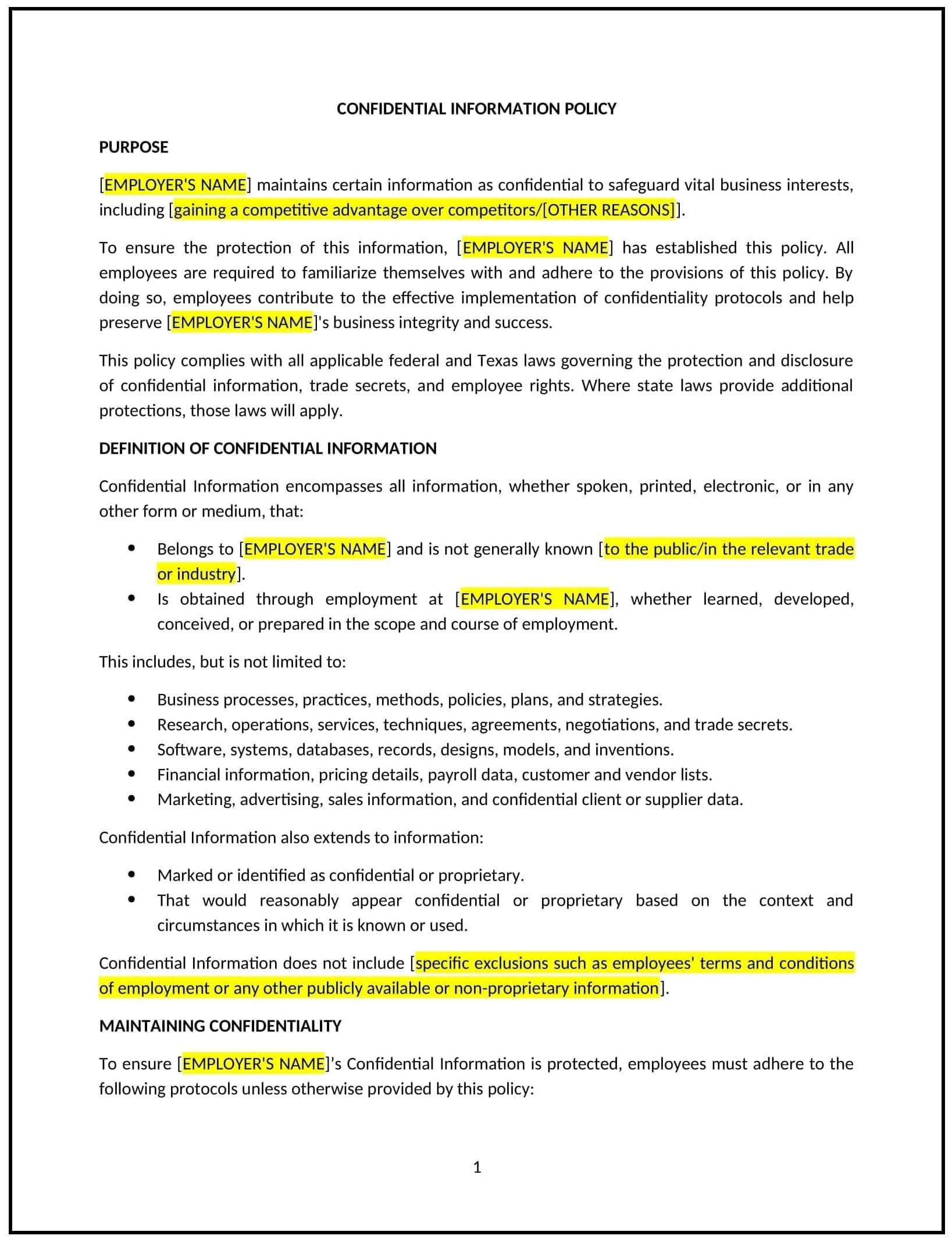Confidential information policy (Texas): Free template
Got contracts to review? While you're here for policies, let Cobrief make contract review effortless—start your free review now.

Customize this template for free
Confidential information policy (Texas)
This confidential information policy is designed to help Texas businesses establish clear guidelines for protecting confidential and proprietary information. Whether businesses are managing employee access to sensitive company data, client information, or trade secrets, this template provides a structured approach to handling confidential information in a way that ensures security and compliance with relevant legal requirements.
By adopting this template, businesses can safeguard their intellectual property, protect customer privacy, and maintain a secure work environment.
How to use this confidential information policy (Texas)
- Define confidential information: Clearly specify what constitutes confidential information, including trade secrets, financial data, client lists, marketing strategies, and other proprietary information that must be protected.
- Establish access controls: Outline the procedures for restricting access to confidential information, ensuring that only authorized employees or contractors have access to sensitive data.
- Specify data handling procedures: Detail how confidential information should be handled, stored, transmitted, and disposed of securely, including encryption, secure file storage, and shredding of physical documents.
- Address confidentiality agreements: Explain the need for employees and third parties (such as contractors or vendors) to sign confidentiality or non-disclosure agreements (NDAs) to legally bind them to keep sensitive information confidential.
- Set consequences for breaches: Clearly outline the actions that will be taken if an employee or third party is found to have violated the confidentiality policy, including disciplinary action, legal remedies, or termination of contracts.
Benefits of using this confidential information policy (Texas)
This policy offers several benefits for Texas businesses:
- Protects intellectual property: A robust policy helps safeguard business-critical intellectual property, ensuring that proprietary information remains secure and confidential.
- Reduces legal risks: By implementing strong protections for confidential information, businesses can reduce the risk of legal action related to data breaches, theft, or misuse of sensitive data.
- Maintains competitive advantage: Protecting confidential information helps businesses maintain their competitive edge by ensuring that sensitive strategies, client data, and trade secrets are not exposed to competitors.
- Builds customer trust: Clients are more likely to trust businesses that clearly demonstrate their commitment to protecting sensitive and personal information, enhancing relationships and customer loyalty.
- Promotes compliance: This policy helps businesses comply with data protection laws, such as the Texas Business and Commerce Code and federal regulations like HIPAA or the GDPR (if applicable).
Tips for using this confidential information policy (Texas)
- Communicate clearly: Ensure all employees are aware of the policy and understand the importance of keeping confidential information secure.
- Provide training: Offer regular training sessions to employees on data protection best practices, identifying confidential information, and handling it securely.
- Implement secure systems: Use encryption, secure file-sharing platforms, and access management tools to protect digital confidential information.
- Monitor compliance: Regularly audit access to confidential information to ensure that employees and third parties are following the policy and that no unauthorized access has occurred.
- Review regularly: Update the policy periodically to reflect changes in Texas state laws, business practices, or the company’s information security needs.